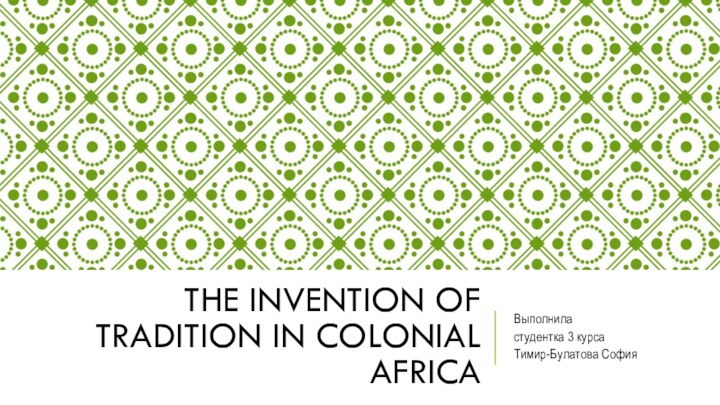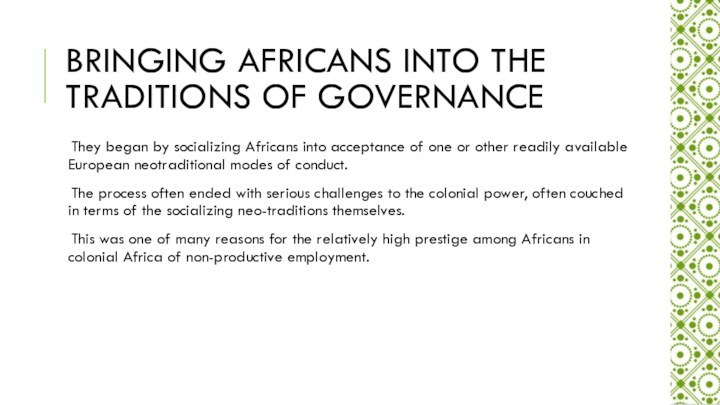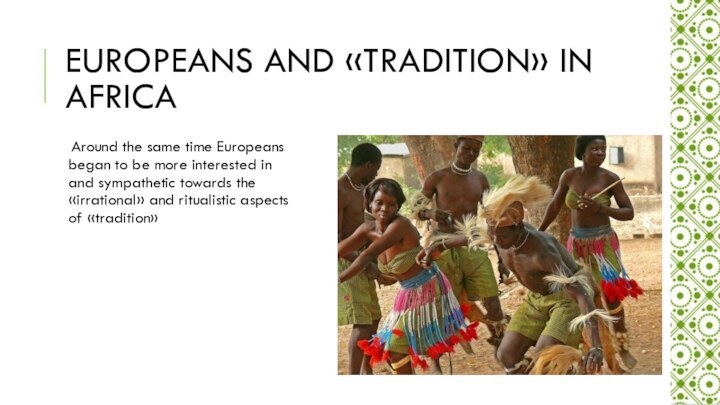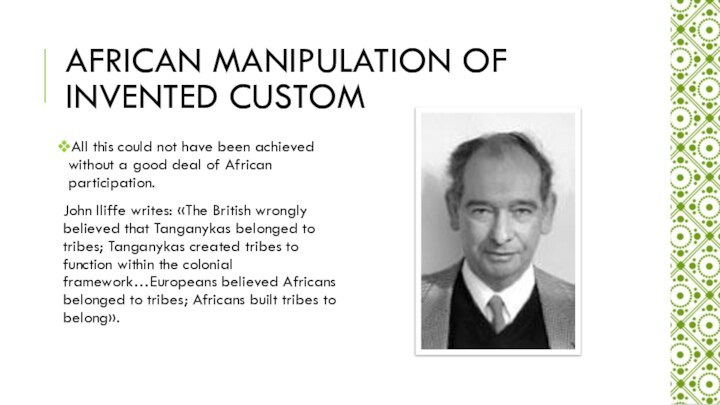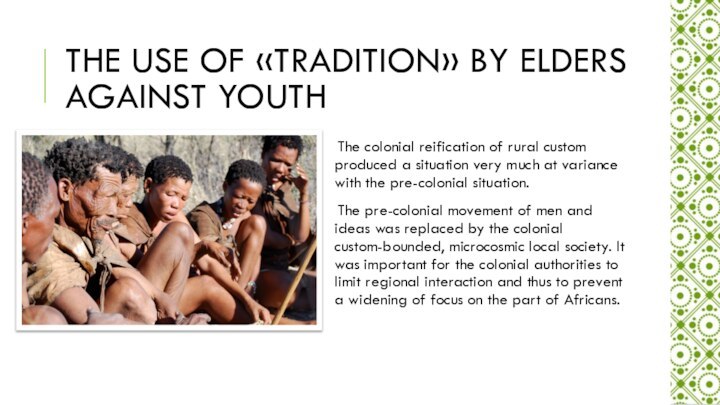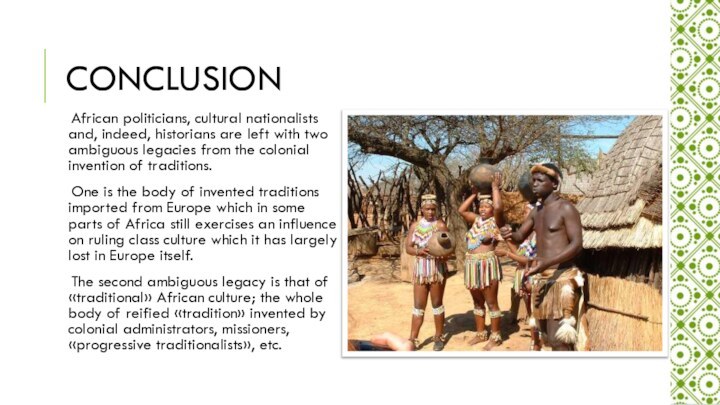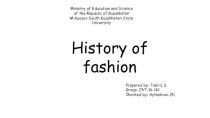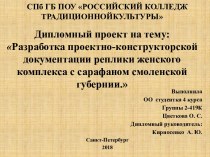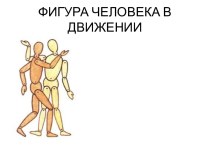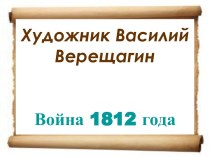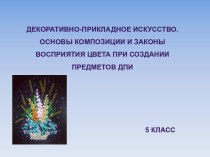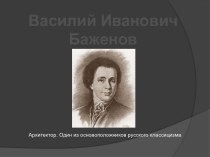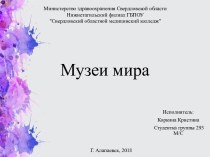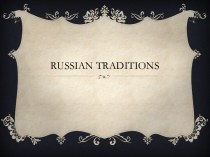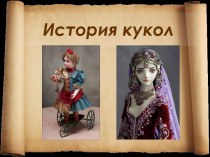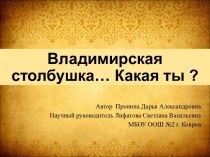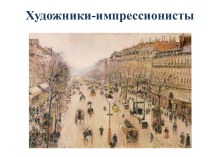Слайд 2
BRINGING AFRICANS INTO THE TRADITIONS OF GOVERNANCE
Two ways
in which Europeans sought to make use of their
invented traditions to transform and modernize African thought and conduct:
1. Acceptance of the idea that some Africans could become members of the governing class of colonial Africa
2. Was an attempt to make use of what European invented traditions had to offer in terms of a redefined relationship between leader and led.
Слайд 3
BRINGING AFRICANS INTO THE TRADITIONS OF GOVERNANCE
Best illustration
of first idea – that some Africans might be
turned into governors by exposure to british neo-tradition – is perhaps the famous school, King’s College, Budo, in Uganda.
King’s College was built on the Coronation Hill of the Baganda kings.
Слайд 4
BRINGING AFRICANS INTO THE TRADITIONS OF GOVERNANCE
Whatever the
tensions of doing so within the imperial framework which
so firmly subordinated the Gandan ruling class to British administrative officers, and the Gandan monarchy to the imperial crown
Слайд 5
BRINGING AFRICANS INTO THE TRADITIONS OF GOVERNANCE
European invented
traditions were important for Africans in a series of
overlapping phases. The military neo-tradition, with its clearly visible demarcations of hierarchy and its obvious centrality to the workings of early colonialism, was a first powerful influence.
Its impact reached a climax – particularly in eastern Africa.
The military mode became less influential that the modes of missionary employment or the bureaucratic build-up of Africans in state and business employment.
Слайд 6
BRINGING AFRICANS INTO THE TRADITIONS OF GOVERNANCE
They began
by socializing Africans into acceptance of one or other
readily available European neotraditional modes of conduct.
The process often ended with serious challenges to the colonial power, often couched in terms of the socializing neo-traditions themselves.
This was one of many reasons for the relatively high prestige among Africans in colonial Africa of non-productive employment.
Слайд 7
EUROPEANS AND «TRADITION» IN AFRICA
The invented traditions of
nineteenth-century Europe had been introduced into Africa to allow
Europeans and certain Africans to combine for «modernizing» ends.
They liked the idea of age-old prescriptive rights and they liked to compare the sort of title which an African chief possessed with they laid claim to themselves.
The assertion by whites that Africans society was profoundly conservative – living within age-old rules which did not change; living within a framework of clearly defined hierarchical status – was by no means always intended as an indictment of African backwardness or reluctance to modernize.
Слайд 8
EUROPEANS AND «TRADITION» IN AFRICA
Nineteenth-century Africa was not
characterized lack of internal social and economic competition, by
the unchallenged authority of the elders, by the acceptance of custom which gave every person – young and old, male and female – a place in society which was defined and protected.
Слайд 9
EUROPEANS AND «TRADITION» IN AFRICA
Around the same time
Europeans began to be more interested in and sympathetic
towards the «irrational» and ritualistic aspects of «tradition»
Слайд 10
AFRICAN MANIPULATION OF INVENTED CUSTOM
All this could not
have been achieved without a good deal of African
participation.
John Iliffe writes: «The British wrongly believed that Tanganykas belonged to tribes; Tanganykas created tribes to function within the colonial framework…Europeans believed Africans belonged to tribes; Africans built tribes to belong».
Слайд 11
AFRICAN MANIPULATION OF INVENTED CUSTOM
Elders tended to appeal
to «tradition» on order to defend their dominance of
the rural means of production against challenge by the young.
Men tended to appeal to «tradition» in order to ensure that the increasing role which women played in production in the rural areas did not result in any diminution of male control over women as economic assets.
Indigenous populations appealed to «tradition» in order to ensure that the migrants who settled amongst them did not achieve political or economic rights.
Слайд 12
THE USE OF «TRADITION» BY ELDERS AGAINST YOUTH
The
colonial reification of rural custom produced a situation very
much at variance with the pre-colonial situation.
The pre-colonial movement of men and ideas was replaced by the colonial custom-bounded, microcosmic local society. It was important for the colonial authorities to limit regional interaction and thus to prevent a widening of focus on the part of Africans.
Слайд 13
THE USE OF «TRADITION» BY MEN AGAINST WOMEN
Thus
«men’s dominance in society, that is their control over
religious beliefs and political organization» was expressed even more clearly in colonial invented custom than it had even been before.
Women had two possible means of asserting themselves against male dominated custom.
They might turn to missionary Christiany and its notions of female rights and duties, or they might seek to use the counter-propositions available within African culture.
Sometimes women sought to develop rites of female initiation which had on the past constituted a balance to male ritual influence in the microcosm.
